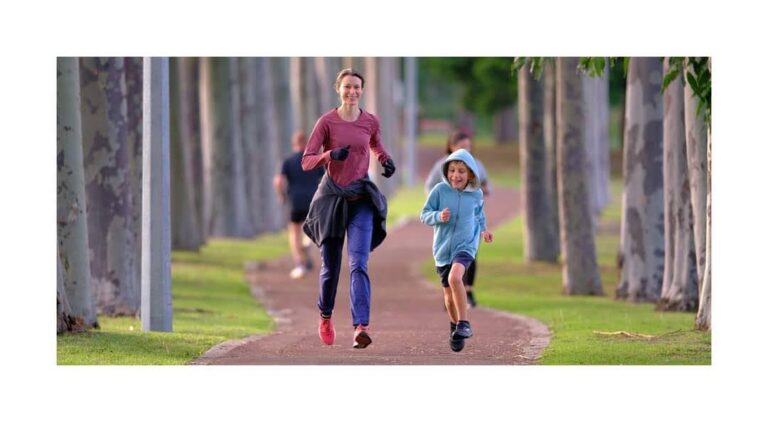
Exercising as parent of young children presents some unique challenges. Here’s some of my personal experiences:
- Putting on a yoga video and falling asleep on the floor
- Getting a second-hand jogging stroller and running tiny laps around my other children at a playground
- Surprising myself by getting up at 5am to work through the Couch-to-5k running program
- Needing to book a babysitter to train for a fun run
- Getting to know which gyms and pools have a creche
- Setting aside time to exercise but instead sitting quietly enjoying the solitude
- Reliving childhood joys with silly trampoline play and questionable ball skills
- Completing the slowest 5km Parkrun ever with an insistent young walker (at least it felt like the slowest ever)
The problem
The problem that all adults face when it comes to exercising as a parent is that we are already squeezed for time and energy. The shock of welcoming a child into your family is both joyous and unrelenting. New parents are responsible for a whole small person 24/7 even if they are not physically present the whole time.
Mothers additionally deal with physical effects of pregnancy and childbirth. Having a baby affects your whole body. Hopefully you gain a new appreciation for what your body is capable of, along with adjusting to being a different shape and building back any loss of pelvic function (with the help of your friendly pelvic health physiotherapist!).
As kids get older the demands on your time change. Schedules become dominated by school terms, appointments, extracurricular activities and birthday parties, in addition to your own work, both paid and unpaid.
Your flexible time is diminished. Your energy sapped. Sleep-ins and personal downtime may be non-existent. If you’ve got anything left in the tank, you may feel guilty for spending your time ‘selfishly’ exercising when you could be having quality time with your child.
Why we still need to exercise
Our bodies crave movement and exertion. Exercising as a parent helps reduces stress, improve sleep quality, and makes us more able to do every day physical tasks. Exercising regularly throughout our lives, decreases the risk of developing osteoarthritis, cardiovascular disease, osteoporosis, metabolic disorders and some cancers.
When parents exercise, children benefit emotionally from having healthier, happier parents, and they benefit physically because children of active parents are more likely to be active themselves.
What exercise do we need?
Here’s the gold standard minimum of what everyone should be aiming for according to the World Health Organisation (WHO):
- At least 2.5 hours per week of moderate physical activity – hard enough to get you puffing a bit.
- 2 sessions of strength training – any activity that involves pulling or pushing something heavy enough to make your muscles tired quickly.
Unfortunately, all the time you spend on your feet doing the work of parenting is probably not enough to meet your body’s exercise needs.
If it sounds daunting, start small and remember that there is a whole buffet of choices when it comes to how you exercise. Often the best type of exercise for you is the one you enjoy the most. Look into what options are available in the community and test a few out.
If you want to exercise more than you currently are, pick up a pen and try this method for figuring out where the sticking points are for you and finding a way forward:
- Write down your barriers – is it time, opportunity, cost, motivation, guilt, fear of injury? Be as specific as possible.
- Write down your ideal exercise regime or a goal you would love to work towards eg. going for regular nature hikes, swimming, joining a dance class, running a half marathon, re-starting a sport you used to love. Whatever sparks excitement in you.
- Discuss your goals and barriers with your partner, friend or family member. See if you can come up with creative solutions together. Solve the easiest problems first and aim to take one small step towards your goal.
How we can help:
- We can help you to problem solve and advise on safe and suitable exercise for you
- We can help you to rehab old injuries or areas of pain or weakness that are preventing you from being active
- We can provide personalised exercise programs and make sure they stay up to date and appropriate to your current abilities
- If you have any bladder leakage or pelvic floor concerns post pregnancy that are holding you back from being active, even if it has been years since you had a baby, book in with our lovely pelvic health physiotherapist here!
Finally, some encouragement:
- It’s OK to change your mind. If you start the year with a great plan and in February it becomes clear that you are not going to stick with it for whatever reason, that’s OK. Assess why it’s not working and adjust as needed. If a plan falls flat, it can be a great opportunity to try different activities until something clicks.
- Flexible persistence is key. Give yourself and your family grace when you inevitably need to pivot because of sickness or pupil free days or the various other complications of family life. Just make sure that staying active doesn’t entirely slip off the list of priorities.
- If you are currently caring for very small children, keep your hand in with whatever little exercise you can manage now, and it will be much easier to take advantage of the greater freedom you have later as your kids become more independent.
